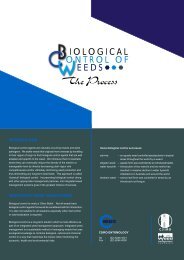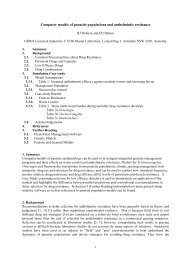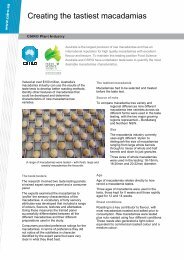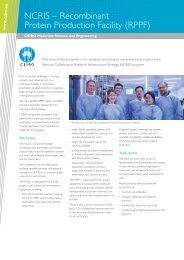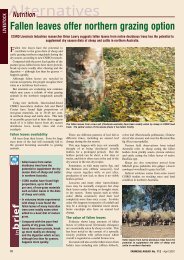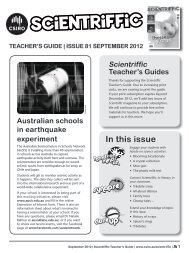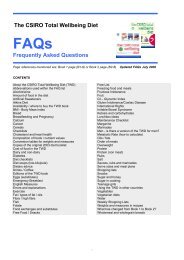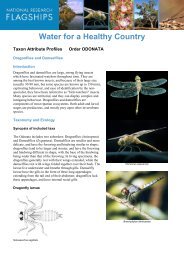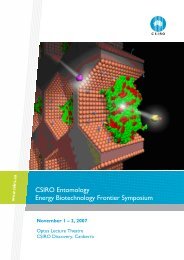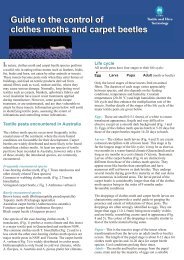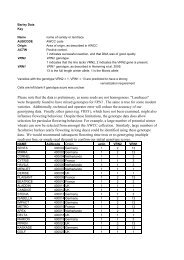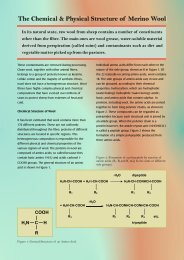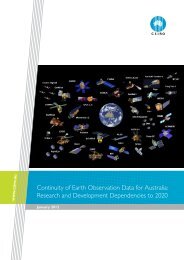WfHC - cover page (not to be used with pre-printed report ... - CSIRO
WfHC - cover page (not to be used with pre-printed report ... - CSIRO
WfHC - cover page (not to be used with pre-printed report ... - CSIRO
You also want an ePaper? Increase the reach of your titles
YUMPU automatically turns print PDFs into web optimized ePapers that Google loves.
<strong>to</strong> comment on the expected average floods over a 20 year period based on his observations<br />
of the marks on the homestead wall:<br />
I haven‟t <strong>be</strong>en out there [<strong>to</strong> Oriners] for years but I‟d say they probably missed out [on a<br />
flood at the homestead] last wet season [2009-10]. I‟d say there would <strong>be</strong> a likelihood, a<br />
chance that wet season <strong>be</strong>fore they would have got some sort of flood there, <strong>be</strong>cause<br />
everyone else in this country did. But no, it‟s <strong>not</strong> every year. Pretty well the same as, like<br />
Koolatah, probably over a 20 year period they‟d probably get 8 or 10 years where there is<br />
floodwater. Depth varies <strong>to</strong>o I suppose, I know a lot of years we <strong>used</strong> <strong>to</strong> go down there and<br />
clean the place up after the wet, but we never had anyone living down there [during the<br />
time Oriners was managed from Dixie Station]. And you know, a lot of times it only went<br />
through the house that deep [1 or 2 foot] and left a water stain on the wall. The deepest<br />
one that I can remem<strong>be</strong>r was about 4 foot.<br />
Colin Hughes<br />
This kind of comment about a „statistical average‟ is less commonly made by Indigenous<br />
cattlemen whose learning involved less formal schooling, but the knowledge of potential<br />
variations can at times <strong>be</strong> greater, as it can encompass more frequent direct observations of<br />
the country and over a longer time period. Mem<strong>be</strong>rs of the Yam family have lived at Oriners<br />
over the wet season a num<strong>be</strong>r of times, and therefore have observed the floods themselves<br />
as well as the flood marks. Paddy Yam also commented that he had witnessed a<strong>not</strong>her<br />
extreme, saying he had once seen the sandy bot<strong>to</strong>m of Jewfish Lagoon, after it nearly went<br />
dry at the end of a long period of low rainfall. This is <strong>not</strong> a common or frequent observation<br />
made about one of the main permanent waterholes on the station. Understanding variability<br />
means understanding the general average pattern, the ways in which that pattern varies in<br />
recurring ways, and identifying events or instances that lie well outside of what one might<br />
expect as part of that variability. All of these kinds of knowledge are evident in the comments<br />
above.<br />
2.1.3 „This month is different‟: abnormal changes<br />
Alongside the expected variability and general averages <strong>not</strong>ed above, there were also<br />
observations of changes in the weather which were more than a single unusual instance.<br />
These were now <strong>not</strong>ed in sufficient num<strong>be</strong>rs that they re<strong>pre</strong>sented a new kind of pattern – a<br />
permanent change <strong>to</strong> what was normal. There was a clear recognition by a num<strong>be</strong>r of<br />
Indigenous people that the weather they now experienced was different from the weather<br />
they remem<strong>be</strong>red from the past:<br />
The seasons have changed. Years ago you could tell the first s<strong>to</strong>rms were coming. There<br />
would <strong>be</strong> an early s<strong>to</strong>rm in Decem<strong>be</strong>r <strong>to</strong> make everything nice for Christmas. Now the<br />
shower rains come earlier and heavier. There are more cyclones <strong>pre</strong>dicted for this country.<br />
It <strong>used</strong> <strong>to</strong> <strong>be</strong> you would see the electrical s<strong>to</strong>rms <strong>be</strong>fore the wet season came. Now the<br />
rains come from anywhere, rather than from the west first.<br />
Alan Creek<br />
---------------------------------------<br />
But now you can <strong>not</strong>ice changes in the weather now, this month is different. It should have<br />
<strong>be</strong>en a wet month now, but it‟s <strong>not</strong>. It should have <strong>be</strong>en raining here, it should have <strong>be</strong>en<br />
raining all around Koolatah, Dunbar, but we are <strong>not</strong> getting that much rain. It‟s <strong>not</strong> like what<br />
it was in the early days in our time, when we were kids, growing up. We had rain around<br />
this month of the year [late Oc<strong>to</strong><strong>be</strong>r] It should <strong>be</strong> pouring rain, I think. Right across<br />
Koolatah, Dunbar, all up here, right down that way and up this way.<br />
Ivan Jimmy<br />
Working Knowledge at Oriners Station, Cape York<br />
45



